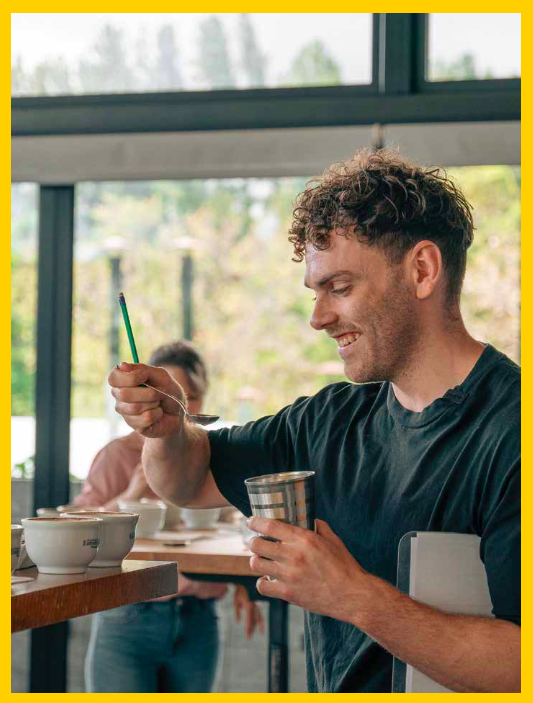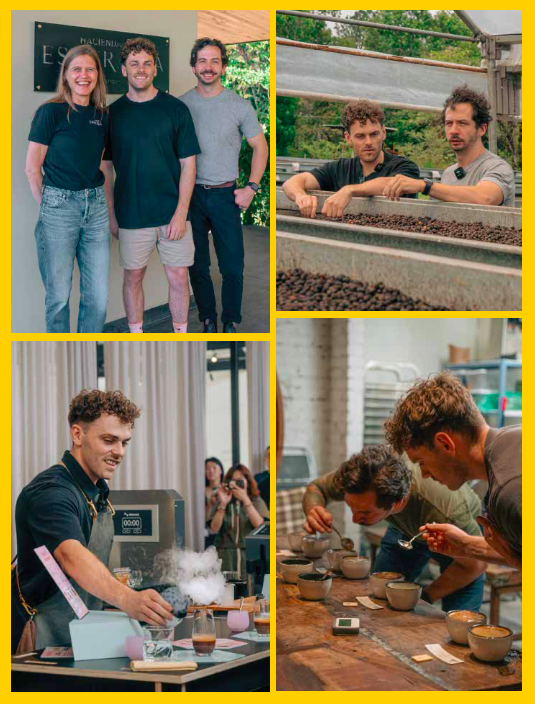
The city of Melbourne is known as a coffee and foodie capital of the World. It’s also home to Axil Coffee Roasters. They have held the Australian Barista Championship title for three years running. Jack Simpson has won two of those titles and placed 2nd overall at the World Barista Championships in May 2024. But what drives this dedication to be the best?
Interview with Jack Simpson from April 2024, before WBC 2024
There’s no denying that competition can be good for business. It has propelled coffee businesses into the limelight and serves as a platform for baristas to make a name for themselves. In Australia, the competition is at its most fierce. Winning the National competition is incredibly challenging amongst the major specialty players. Axil Coffee Roasters has certainly stepped up in recent years, with Anthony Douglas becoming the World Barista Champion in 2022, and Jack Simpson placing 3rd in 2023 and working his way higher up the podium in 2024, becoming the Runner Up behind Champion Mikael Jasin.
How did you get started in the coffee world? And what was Jack before coffee?
I started working in a local bakery and cafe in a small country town when I was 16. We were one of the only places in town to get a coffee. Luckily, I was working with someone that was involved in the start of speciality coffee in Melbourne and she taught me lots. From there I was hooked! After finishing school, I was working as an apprentice carpenter. This job allowed me to travel around Melbourne and I would always leave an extra half an hour in the morning to get a coffee. I was trying the best coffee in Melbourne every morning and it was the highlight of my day, so much so that I quit my job to become a barista!
How long have you been with Axil Coffee Roasters (and in what role/s) and is it as much fun to work there as it looks on social media?
I’ve been working here off and on around 8 years now! I spent two years in Montreal in-between. It’s a blast! We have a really good team here and some of my best friends work here too. I wouldn’t want to work anywhere else. I started as a barista, have worked in the Roastery and managed the cafe in the past. Right now I’m working in Quality Control and Sales. I’m very lucky that it is a dynamic role which allows me to do a lot of different things and also that the team as a whole is so passionate about competition.
Tell us about the Australian coffee market, from the perspective of one of the leading specialty brands out there. Is it growing? Thriving? Over-saturated? And how do you stay relevant or successful in Melbourne, a place so well renowned for their coffee.
This is a hard one to answer! I think Melbourne is a place like no other, there is a lot of speciality coffee here, which is amazing. There is lots of competition in terms of cafes and roasters, but I think this is a healthy environment to exist in. It pushes us to be the best we can be and the result is that we have some of the best cafes in the world right here! To stay relevant just requires us to keep trying new ideas and maintain amazing customer service. I think we (Melbourne) have done a great job of educating our customers, so as much as there are a lot of good cafes around, customers are also looking for unique experiences through speciality coffee!
What was the performance you witnessed on the WBC stage that sparked a passion for coffee competition in you?
There have been a few! Lex Wenneker (2016), Dale Harris (2017) and Matt Perger (2013). They all had a mixture of innovation and a well put together routines!
Lex, quite ahead of his time, pulled out a set which featured three different varietals from the same farm, and also included brewing each of the coffees as a filter coffee as part of his tasting menu style set.
Dale’s presentation was an unusual interpretation of cup profile and a more interactive organisation of the workstation. Dale had invested a lot of time into the study of the aromatic compounds found in coffee, of which there are more than 1000 that we know of. He selected ten of the most significant ones in his coffee that carry certain flavours and explained what flavour do they translate into in his espresso. He also navigated the judges with a perfectly structured tasting boards, charts and objects that carried some of the aromatic compounds in his coffee. Additionally, he welcomed them to the second bar he created for his signature beverage presentation.
Matt pushed a lot of boundaries for 2013, he used frozen espresso vessels; he implemented the “nutation” tamping technique (which he does not recommend); a signature beverage comprised entirely of espresso and water, pulled from the Nuova Simonelli; post-grinder particle sifting directly into the portafilter basket; and an incredible amount of attention to detail about the grazing habits of two milk cows, called “Freckles” and “Blossom”
Every competitor needs a team behind them, if you had to give advice to a coffee professional looking to build a powerhouse competition team, what would you tell them?
I’m very lucky to have an amazing team in Matt Crowley, Dave Makin and Anthony Douglas (World Barista Champion 2022), to name a few. We all have our strengths and weaknesses. For me, it’s about finding the people that you trust and are well calibrated with in terms of tasting coffee. Having people that are willing to challenge you and not just agree with you all the time is also important, we have a lot of robust conversations! I take on as much feedback from the team as I can, even if I don’t agree with it, I take the time to take it in and then make the most informed decisions I can. It’s important that at the end of the day that its your decisions up on stage and you are comfortable with everything.

You and the Axil team have done a lot of experimentation with milk for competition over the years. What is the current wisdom on getting the best from dairy milk? And follow up, have you implemented any of that research into day to day cafe life?
I’m implementing my latest experiment on stage at the World Barista Championships in Busan, in May, so I can't give too much away! But I think in essence, it’s about starting with the best product you can. There are big differences in consistency with each dairy farm so finding the right one to use is the first step. Next, I find reducing the water content to some degree, beneficial. I use a freeze drier to accomplish this as it is removes only water, leaving all the important minerals behind. It’s important to remove only water as if you lose other minerals, I find the milk loses balance and affect the taste. It’s very difficult at this stage to implement this into the cafe environment. To make one litre of the milk that I use in competition takes about three days and has over twice the original milk solids. So it would be very expensive to put on the menu! Not really feasible for a busy cafe.
You used some pretty funky technology/equipment in your most recent set, can you please explain the theory behind the Waved Single Wavemaker and how it impacts coffee?
For sure, the Waved technology is sending ultra low frequency magnetic waves through water, and with espresso being close to 90% water, it has a huge effect. It basically vibrates the molecules in the espresso, encouraging them to bond together. Notable polyphenols in the espresso like caffeine, after the Waved bonds them together, we are perceiving these bitter notes less. Our perception of bitterness is decreased, therefore we are able to perceive more sweetness in the espresso.
Following on from that, there is definitely a shift to automation within the industry, what are your thoughts of the role of the barista moving forward? How do we continue to value that role?
I spoke a little to this last year in my competition set. I believe that we as baristas should embrace some of this automation (if it’s having a positive effect) and utilise the time to make improvements elsewhere in our workflow and service. Also, just because something is automated doesn’t mean that it is consistent and can give you a reliable result every time. Take automated tamping, if your puck preparation isn’t great it doesn’t automatically make better coffee, but not having to think about tamping, allows you more time to perfect your distribution. So I think the key is to work with it, rather than against it.
Have you spent any time at a coffee origin and what did you take away from that experience?
***I’m leaving for my first trip this weekend! I’m heading to Panama to connect with producers I’ve met previously at different coffee events! I’m planning to do a little bit of work with fermentation later this year in Colombia too!***
What’s your favourite piece of brewing equipment that you absolutely cannot live without?
As much as I love espresso, it’s my V60 pour over and hand grinder. I take them everywhere!
When you are not coffee-ing, what are the activities you love?
At the moment, it feels like my whole life! But I also love sport. I was playing cricket (put that on pause for comp) and play soccer in the winter. Kayaking and fishing takes up my time too as well as Spending time with family.
We’ve heard you love the English Premier League! Who’s your team? And how did you get into that?
Liverpool! YNWA. I can’t miss a game! I was watching the game as I was setting up my trolly for the National comp! Its slightly hard to watch here with the time zone, but I was always keeping an eye on it. Once I moved to Canada in 2019 and the time zone matched I haven’t stopped watching. Now I’m waking up early or staying up late every week!
What is your absolute favourite thing to eat?
Pizza, I could eat it every day!
Name 3 bands/musicians that you’re listening to right now please.
Dope Lemon, Dua Lipa, Zach Bryan
Champion Baristas are human too! We're excited for what this year holds in the competition world!